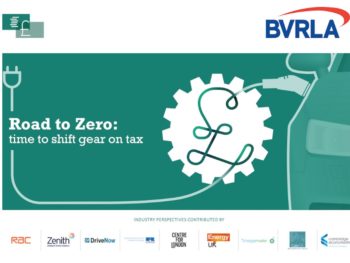BVRLA report calls for new approach to motoring tax
The BVRLA, backed by fleets, the automotive industry and MPs, is calling for a new policy on motoring taxation that would help shape future mobility solutions as the market moves to increasingly connected, electric and shared road transport.

Nine organisations representing economists, fleets, motorists, the automotive industry, energy providers, and local government have contributed to the report
The ‘Road to Zero: time to shift gear on tax’ report, which feature input from nine organisations representing economists, fleets, motorists, the automotive industry, energy providers and local government, warns that future Government tax policy needs to take into account the changing face of motoring.
They point to the impending decline in revenues from the current CO2 emissions-based regime and highlight the potential for a new tax system that could help tackle devolved transport priorities including urban air quality and congestion.
Key findings include:
- ‘No change’ on vehicle tax isn’t an option: the consequences for drivers and the environment are too severe and the opportunities to seize are too great
- New technologies present an opportunity to develop a fairer and more sophisticated tax system that could be based on distance travelled, time of journey, location or air pollution
- Government taxes and incentives need to give fleets and motorists a clearer and more consistent long-term message that investing in plug-in electric vehicles will bring economic benefits
- The Treasury needs to protect future motoring tax receipts as drivers move to electric vehicles and CO2 -based income declines – by up to £2bn per year
- The UK’s increasingly devolved transport policy has given cities and regions greater powers to impose local motoring charges and taxes. Local policymakers need greater national government support in designing and implementing these schemes so that they are both fair and consistent
- The way we are driving is changing – from ownership to shared use – and the tax system needs to keep up.
Launching the report today, BVRLA chief executive Gerry Keaney said: “Time to Shift Gear on Tax is the first report of its kind, bringing together a host of policy perspectives and ideas that all demonstrate the urgent need for vehicle tax reform. We thank all our partners for their brilliant contributions.
“Fuel duty, VED and Company Car Tax have been successful in driving down carbon emissions. Now it is time to go back to the drawing board and explore how the fiscal regime could also make roads safer, less congested and fit for the future.”
The report has been backed up by a letter to the chancellor, co-signed by most of the contributors, which calls on the Government to:
Commission an independent and wide-ranging review into the modernisation of the motoring tax system for a zero-emission future.
Focus on delivering a fair, transparent and adaptable national motoring tax regime capable of funding the UK road network and driving behaviour change that reduces congestion and air pollution.
Develop a national road-user charging policy that can support cities and regions if they choose to implement local motoring charging schemes.
Gerry Keaney continued: “We want the report to kick-start a process of change, with industry working with the Treasury. A taskforce with the kind of expertise shown in the report will help drive this forward.
“The exciting vision set out by the Government’s Road to Zero Report and Industrial Strategy demonstrates that transport is a priority. UK policymakers have been busy creating the right infrastructure and regulatory environment for connected, autonomous and electric cars. Now is the time to look at tax.”
To access the report, click here.












